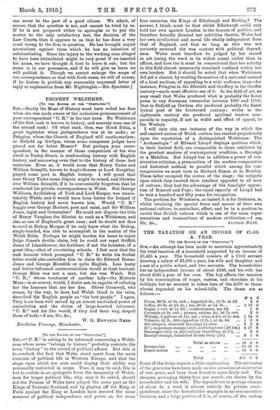EMINENT WELSHMEN.
[To THE EDITOR OP THE "Spscrixos.'1 SIR,—Surely the Muse of History must have veiled her face when she was made aware of the audacious pronouncement of your correspondent " C. R." in the last issue. No Welshman of the first rank is known to history, and scarcely even one of the second rank ! Of what rank, then, was Houd Ddha, a great legislator when jurisprudence was at its nadir ; or Pelagius, whom the Church of England still anathematises ; or Dafydd ap Gwilym, whom some competent judges have placed not far below Homer P But perhaps your corre- spondent, in the manner of those compatriots of his who dwelt in Tooley Street, is confounding history with English history, and narrowing even that to the history of these last centuries. Even so, it would seem that Henry Tudor and William Seissyllt, known to Anglo-Saxons as Lord Burghley, played some part in English history. I will grant that over Henry Tudor some dispute might be raised, and likewise over William Seissyllt, if it be conveniently forgotten that he conducted his private correspondence in Welsh. But George Williams, Archbishop of York and Lord Keeper, was unmis- takably Welsh, and it would have been better for Ireland if English history had never known him. Would " C. R." boggle over George Herbert, poet and saint, and Sir William Jones, legist and Orientalist? He could not dispute the title of Henry Vaughan the Silurist to rank as a Welshman, and also as one of England's great ones ; and he would not dare to cavil at Bishop Morgan if he only knew what the Bishop, single-handed, was able to accomplish in the matter of the Welsh Bible. Perhaps he might harden his heart to reject Inigo Jones's double claim, but he could not repel Griffith Jones of Llanddowror, the fertiliser, if not the inventor, of a great idea,—that of circulating schools. I feel sure. that the rash humour which prompted " C. R." to write his foolish letter would also embolden him to claim Sir Edward Burne- Jones and George Meredith as quite English. Less hasty and better-informed controversialists would at least hesitate. George Eliot was not a man, but she was Welsh. But "C. R.," whose treatment of another lady—the Historic Muse—is so scurvy, would, I doubt not, be capable of refusing her the honours that are her due. Oliver Cromwell, who seems, by the way, to have had Welsh blood in his veins, described the English people as "the best people." I agree. They have been well served by an almost unrivalled power of assimilation and the virtue of large-hearted tolerance. " C. R." and his like would, if they had their way, despoil them of both.—I am, Sir, &c., Pendleton Vicarage, Manchester. W. G. EDWARDS RIES.














































 Previous page
Previous page